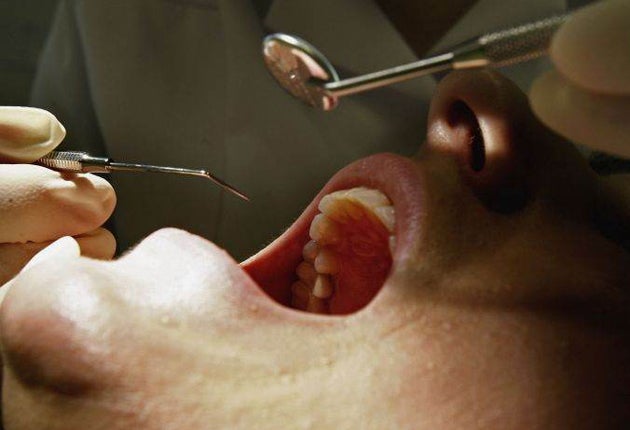Dental patients put at risk by banned fake-gold implants
Some dentists are using cheap yellow alloys for crowns and bridges in order to make more money

Unscrupulous dentists are boosting their profits by using cheap, potentially dangerous, fake-gold crowns and bridges on unsuspecting patients, The Independent on Sunday can reveal.
Dental laboratories across the country are making thousands of gold-coloured dental implants every year for NHS and private dentists at a fraction of the price of real gold. Although some patients may agree to the cheaper metal to save money, NHS dentists are not allowed to use the controversial copper-aluminium-based alloys which corrode and release potentially toxic metal ions into the mouth.
There is no way of knowing how widely the use of fake-gold fillings has spread as the NHS no longer collects information on it. And, increasingly, dentists are importing cheaper products from countries such as China.
Seven out of 30 dental practices called covertly by The IoS last month said the dentist would discuss cheaper gold-looking options face-to-face. This is against the law.
Farshid Azar, a dentist, was ordered to be struck off last month after he was found guilty of claiming thousands of pounds for NHS dental work he never carried out, and for failing to act in the best interests of his patients. This followed a criminal conviction in 2007 on 10 separate counts of obtaining money by deception, which included fraudulently using fake-gold alloys.
Under the new dental contracts introduced in 2006, dentists are paid a monthly salary in return for a pre-agreed number of units of dental activity (UDAs). A crown or a bridge counts for 12 UDAs, currently worth £190. This payment covers all material costs, which means the cheaper the lab work, the more profit the dentist makes.
At least a million crowns, dentures and bridges are fitted in UK patients every year, of which 50,000 to 100,000 are made abroad, according to the Dental Laboratories Association. While UK lab technicians are regulated by the General Dental Council, dentists can bypass this safety net by using cheaper, unregulated foreign labs. Most patients have no idea where their crown or dentures are made, by whom, or from what.
The IoS has learnt that one large dental alloy supply company is selling between 1kg and 2kg of the fake gold to laboratories every month – enough to make more than 1,000 crowns. One lab owner admitted to making around 150 gold-coloured crowns every month for NHS dentists scattered across an area including Sussex, Berkshire and Wales.
Richard Daniels, chief executive of the DLA, said: "Most people will need a crown or a bridge at some point, so it is not a matter of if you'll be affected, but when. It is then a matter of Russian roulette as to what you get in your mouth, which is totally unacceptable in this day and age. Patients would be much better protected if the MHRA [Medicines and Health products Regulatory Agency] properly and proactively policed dentists and analysed dental implants being imported every year."
Materials used for teeth must be strong enough to withstand attack from saliva and bacteria. Fake-gold alloys first came on to the market when gold prices started to rocket in the 1990s. At the time, there was no internationally accepted way to test their corrosion resistance.
An internationally accepted safety test has since been introduced which shows that the vast majority of gold-coloured alloys on the market are hundreds of times more corrosive than precious-metal alloys.
But new EU rules intended to force dentists to give patients written information about the composition and source of their dental appliance were watered down after pressure from the MHRA, which said it would struggle to enforce them.
The NHS Counter Fraud Service is investigating two separate cases after tip-offs from whistle-blowers but is heavily reliant on co-operation from lab owners over whom they have no jurisdiction.
Join our commenting forum
Join thought-provoking conversations, follow other Independent readers and see their replies
Comments